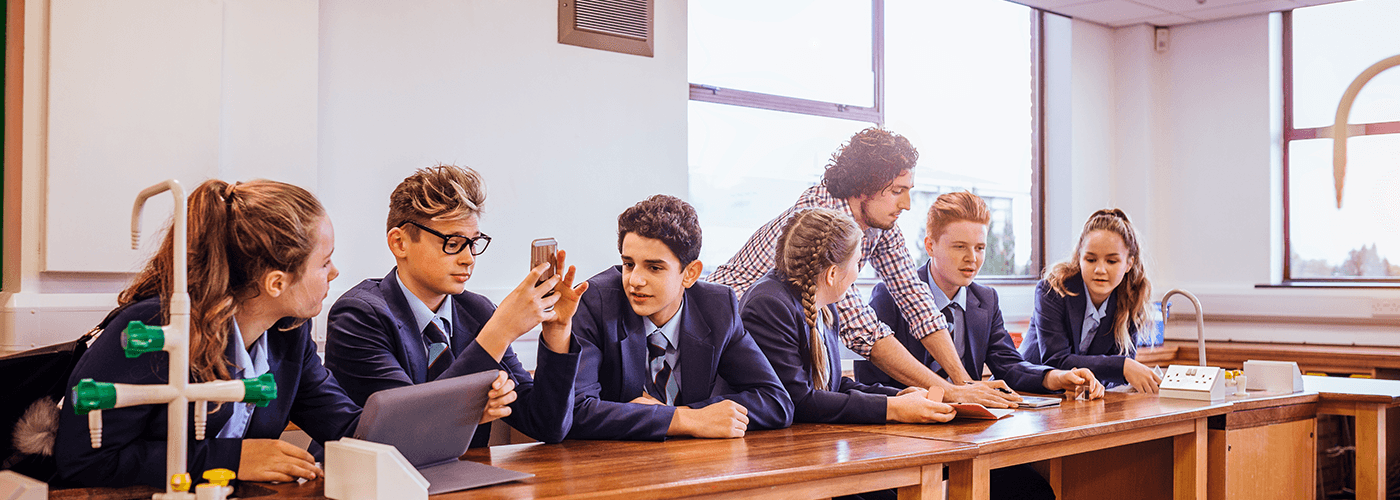Let's connect
Talk to us
Talk to an expert or book a demo. Our Digital Wellbeing experts are waiting to help.
Stay in touch
Sign up for our newsletter to get all the latest product information.

The minister for school standards Nick Gibb believes that schools should ban smartphone use.
This view would seem supported by Dr Richard Murphy at the London School of economics whose research found, “banning mobile phones improved students’ GCSE outcomes to the extent equivalent to an additional hour a week in school or to increasing the school year by five days.”
A phone–free school campaign set-up in May 2019 by Parents and Teachers for Excellence has been supported by over 140 school leaders, and polling conducted by Internet Matters found that less than 10% of parents thought phones should be allowed in the classroom.
With evidence showing academic improvement and growing support for mobile phones to be banned, it is not surprising that Eton College banned phones from pupils at night in June 2018 and then fully during the school day in October 2018. Unexpectedly, the pupils at Eton College responded positively to having an “enforced break”. There was, however, an apparent backlash from some teaching staff who saw “mobile phones as a useful teaching aid.”
It was reported, as part of the changes Eton made to their digital strategy, a decision to roll out a tablet device program was made across the whole school. This approach is a way in which schools can still offer the teaching resources that are useful within lessons but through managed school devices that can be fully monitored and checked for safety. They could also be controlled through filtering so that the devices protected from any access to harmful content. This method could be enhanced further by using a classroom management system that acts as a tool for teachers to ensure pupils remain on task in lessons and can see if a child is distracted or off task.
Headteacher Alison Gill highlighted in the debate for banning mobile phones, “we have a computer suite, where students can use the internet, under supervision. We’ve no way of tracking what they’re looking at on their phones, iPads or smart watches.”
With the right digital safety solutions, it is possible for independent schools to implement safe and monitored use of the internet across all devices whether pupils are using tablets or desktops including iPads and Chromebooks. A robust provider can vary options in both the way it filters granularly so that different ages and user groups can have access to appropriate materials at the right time, and also in deployment and management so that it can meet the individual school’s technological and staffing needs.
Some independent schools may be concerned that parents of boarders, or those who work long hours or overseas, might be opposed to this kind of ban as they fear their contact with their children may be affected. In this instance, schools may choose to find a balance by offering fixed times when phones can be allowed out of core learning hours.
In a letter reasoning to parents about the new digital strategy Eton was introducing, the Headmaster wrote that the college:
“recognises the benefits of mobile technologies and educates boys in using these responsibly” but which also “protects boys from the downsides of over-use and from the dangers of mobile phone addiction.”
By rolling out a digital strategy that protects students from the dangers and distractions of the internet but provides the opportunity and benefits of online learning, student achievement and wellbeing can be improved.
Speak to one of our specialists today and find out how Smoothwall can help you and your school, college or MAT.
Get in touchTalk to an expert or book a demo. Our Digital Wellbeing experts are waiting to help.
Sign up for our newsletter to get all the latest product information.